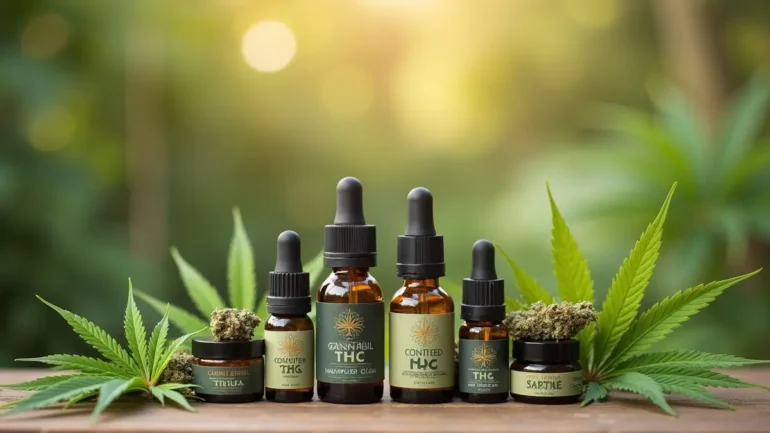As natural wellness solutions gain popularity, CBD and THC have emerged as frontrunners in the quest for alternative health remedies. These cannabis-derived compounds offer a range of potential benefits, but understanding their differences is crucial for making informed decisions.
Let’s explore the unique properties of CBD and THC and their roles in modern wellness practices.
Decoding CBD and THC
Cannabidiol (CBD) and tetrahydrocannabinol (THC) are two primary compounds found in cannabis plants. While they share a common origin, their effects on the human body differ significantly. CBD is non-psychoactive, offering potential therapeutic benefits without the “high” associated with cannabis use.
In contrast, THC is psychoactive, responsible for the euphoric sensations many users experience.
Navigating the Legal Landscape
The legal status of CBD and THC varies widely across jurisdictions. CBD derived from hemp is legal in many areas, leading to a proliferation of CBD products in the wellness market. THC, however, faces stricter regulations in most places. This legal distinction has significantly influenced the availability and research of these compounds.
CBD: A Versatile Wellness Ally
CBD has garnered attention for its potential to address various health concerns:
- Stress and anxiety management
- Chronic pain relief
- Reduction of inflammation
- Sleep quality improvement
- Skin health enhancement
Many users report a sense of calm and balance without the intoxicating effects associated with THC.
THC: Beyond Recreation
While often associated with recreational use, THC offers potential therapeutic benefits:
- Acute pain management
- Nausea and vomiting reduction
- Appetite stimulation
- Muscle tension relief
Some medical cannabis programs utilize THC-containing products to help patients manage symptoms of various conditions.
Pain Management Debate
Both CBD and THC show promise in pain management, but their mechanisms differ. CBD may help by reducing inflammation and interacting with pain receptors, while THC’s pain-relieving properties are often linked to its psychoactive effects. Some users find that a combination of both compounds provides the most effective relief.
Anxiety and Mood: CBD’s Potential Advantage
In the realm of anxiety and mood disorders, CBD has gained significant traction. Many users report feeling more relaxed and less anxious after using CBD products. THC, while potentially beneficial for some, may exacerbate anxiety in certain individuals, especially at higher doses.
Sleep Solutions: Finding the Right Balance
Both CBD and THC may influence sleep patterns. CBD is often associated with promoting relaxation and potentially improving sleep quality without causing drowsiness. THC, particularly in certain strains, is known for its sedative effects, which some users find helpful for falling asleep.
Entourage Effect: A Synergistic Approach
Some researchers propose that CBD and THC work best when used together, along with other cannabinoids and terpenes found in the cannabis plant. This synergistic interaction is known as the entourage effect. Products that contain a balanced ratio of CBD to THC, or full-spectrum CBD oils, aim to capitalize on this phenomenon.
Beyond oils, many cannabis enthusiasts also explore various concentrates that similarly leverage the entourage effect for enhanced therapeutic or recreational experiences. Hash, a traditional form of cannabis concentrate, exemplifies this, offering a concentrated profile of cannabinoids and terpenes. Its diverse forms, ranging from dry sift to bubble hash, are produced through distinct methods, each yielding unique textures and potencies. For those interested in delving deeper into these fascinating preparations and their characteristics, Lowtemp Industries’ guide to types of hash provides comprehensive insights. Exploring these different types can significantly broaden one’s understanding of cannabis product diversity.
Selecting the Right Product
With the wide variety of CBD and THC products available, it’s essential to consider your specific needs and preferences. Factors to consider include:
- Desired effects
- Legal status in your area
- Consumption method (oils, edibles, vaping, etc.)
- Potential drug interactions
- Personal sensitivity to THC
Safety First
While CBD is generally well-tolerated, it’s important to be aware of potential side effects and drug interactions. THC use comes with additional considerations, including its psychoactive effects and potential long-term impacts on mental health, particularly in younger users.
Future of Cannabinoid Research
As interest in CBD and THC continues to grow, so does the body of research surrounding these compounds. Ongoing studies are exploring their potential in treating a wide range of conditions, from neurodegenerative diseases to mental health disorders.
Conclusion
CBD and THC offer unique properties that may benefit various aspects of health and wellness. While THC provides the characteristic effects associated with cannabis use, CBD offers potential therapeutic benefits without intoxication. As research progresses, we may uncover even more applications for these fascinating compounds.
Whether you’re considering CBD for relaxation or exploring medical cannabis options, it’s crucial to make informed decisions and consult with healthcare professionals to ensure safe and effective use.





